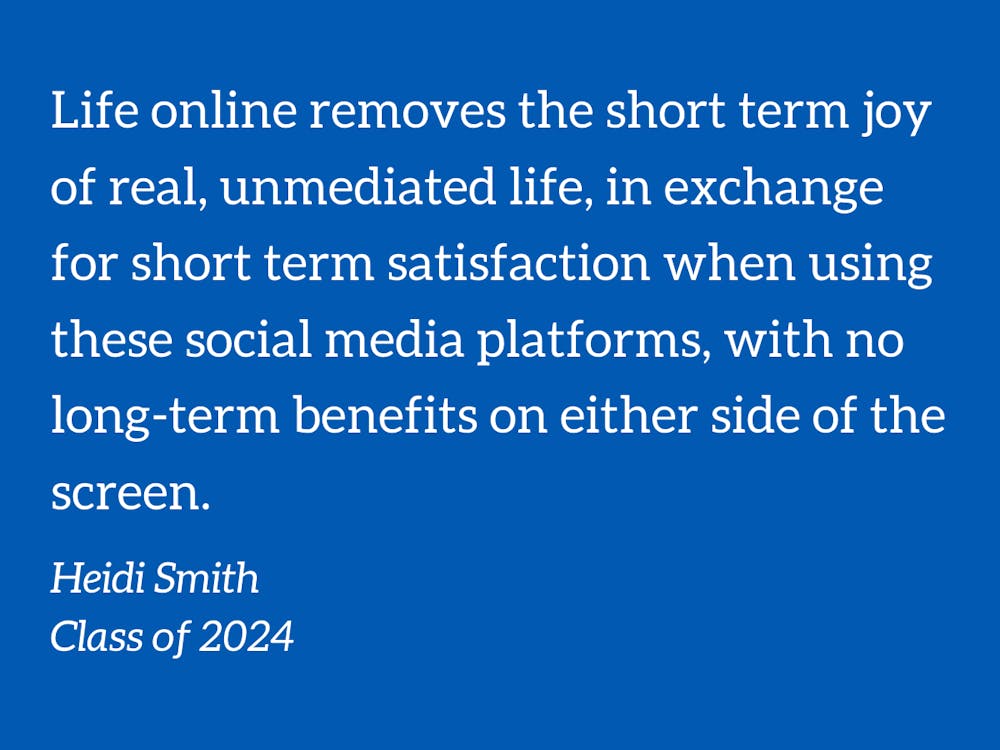It has been about a year—or a year by Spotify Wrapped standards, at least—since I gave up most forms of social media as a quasi New Year’s resolution/personal challenge. After kicking the idea around in my head for a while, reading the book Digital Minimalism by Cal Newport was the push I needed to get started (this is the only time you’ll see me recommend a self-help book). Newport challenges readers to evaluate their relationship with technology to create a meaningful personal life without fully abandoning the internet.
In line with Newport’s suggestion, I essentially deleted all social media apps from my phone for a month as a way of taking a break to examine the extent to which each platform was beneficial to my life. At some point in my mind, this challenge turned from a month to a year, and now the hiatus has become indefinite. I haven’t abandoned social media entirely, but I do refrain entirely from using those that I see as most detrimental, notably Instagram, Facebook and TikTok.
The reporting of negative aspects of social media seems rather played out at this point—from the companies themselves, even—but most often, these arguments adknowledge the positives as well, which I am unsure really exist. I’ll focus on Instagram, because it seems to combine the most pernicious aspects of most of the major platforms—or, if it doesn’t, it will in a couple years—into a nonthreatening, cotton-candy colored package. The further temporally removed I am from frequently using the app, the harder it is to recall any of the supposed benefits.
The biggest draw to Instagram appears to be “keeping up with friends.” It is, however, neither a very good way of keeping up with someone, nor a place where most of the people you interact with are friends. Rather, it’s the highlight reel of your several hundred nearest and dearest people you have possibly met at least once but wouldn’t acknowledge if you saw them in public. We know this, but we still pretend like our lives will be worse off if we can’t see who that random girl from high school is getting married to or what ostentatious vacation the person you met during O-Week is on now.
There isn’t a good reason to want to keep up with someone solely through these platforms. I realized I only wanted to see what these random people are doing out of spite or jealousy; basically, it was to compare myself to them and then either feel superior or angry, neither of which is all that great. Or perhaps, I wanted to gain an impression of someone before I met them. If I truly care about what is going on in someone’s life for presumably benign reasons, I’m already friends with them in real life, and I can text them or, better yet, physically ask them.
Further, the act of content creation feels just as bad. There was this very specific mindset when I engaged with these platforms, wherein I subconsciously framed my present and future experiences in terms of how and where they could be posted, despite not usually actually going about posting them. Sure, posting enables your “friends” to “see what you’re up to,” but it hinders your ability to really be up to anything of substance when your head is stuck in the cloud.
It’s nice to have pictures to look back on, but we have mental memories for a reason. It’s important to think about who all those pictures and posts are for. The greater ease of living in the moment, afforded by my abstention of these apps, feels almost selfishly good, compared to the futility and confinement of the posting mindset. Life online removes the short term joy of real, unmediated life, in exchange for short term satisfaction when using these social media platforms, with no long-term benefits on either side of the screen. Social media and the like are excellent for a one-off chuckle, but fail to provide the continuity and fulfillment of real hobbies, like reading books or playing an instrument.
While I would love to see the dissolution of major social media networks, I strongly doubt that this will happen in the near future. So, it is up to us as individuals to speak, not with our money, but with our arguably most precious resources, our time and attention. It’s all but dystopian the amount of time so many of us unquestioningly give up for the sake of a little bit of easy enjoyment. While personally, removing myself from the bulk of my digitally mediated life was the best thing to do, I don’t expect many others to allow themselves to do the same. If other people can really, truly gain tangibly positive impacts from the use of social media, I’m really happy for them. Otherwise, why are you giving up so much of your life and not getting anything in return?
Heidi Smith is a Trinity sophomore. Her column runs on alternate Wednesdays.
Get The Chronicle straight to your inbox
Signup for our weekly newsletter. Cancel at any time.

